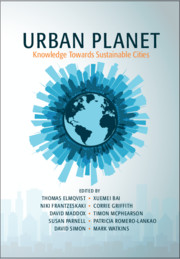The movement for greening our cities is gathering momentum – but the time has come to move beyond tokenistic measures and to truly consider what type of cities we want to leave for future generations. It’s time for those of us in leadership roles to “walk the talk” through our bold decisions and actions to ensure that the issue becomes a mainstream imperative rather than a side, niche movement that is viewed only as the domain of environmental activists.
There are numerous examples of approaches and projects related to “greening cities” throughout the world – all with good intentions; however, I fear that we often celebrate mediocrity and think that the job is done if we plant a few more trees.
This is not to diminish the fine efforts of all involved in this movement or tree planting. We must also acknowledge that many approaches to greening are already ambitious and bold and to be applauded, with the City of Melbourne (in my home country of Australia) setting a fine example.
Pockets of best practice, however, are no longer an option if cities throughout the world, no matter how large or small, are going to address the impacts of climate change and create urban places and spaces that are liveable and inviting; responsive to environmental factors such as pressure on water resources and increasing temperatures; and able to promote and protect biodiversity, as well as considering the health and well-being of urban communities – for both current and future generations.
We all need to be part of creating urban environments that present our children with opportunities to experience and appreciate nature in their urban environment by mainstreaming the urban forest paradigm as the standard, not the exception. This is much more than an environmental issue – it is the key moral and ethical issue of our generation. If we create green cities and provide opportunities for our children to connect with nature in our urban environment, we are more likely to produce future generations, through our example and their experience, who will respect the planet, preserve and conserve our valued natural environments, and continue to support and build urban environments that are healthy, ecologically diverse, and livable in the future.
Mainstreaming urban forests is, of course, not without its challenges – including inertia surrounding departure from traditional notions of the look and feel of cities, resource requirements, design conflicts, tree selection that encourages the use of native species, community engagement, and enthusiasm. These challenges need to be confronted globally and prioritized as an imperative, with greening cities promoted as an once-in-a-lifetime opportunity to transform existing urban environments and to breathe life and soul back into our cities. Of course, there will be significant economic advantages, including healthier and happier communities resulting in reduced health costs; healthy ecosystems resulting in reduced costs associated with redressing environmental issues; and vibrant and activated city spaces that attract and embolden people.
All leaders must prioritize, through bold action and example, the greening of our cities and to see it as an opportunity to create urban spaces that reconnect all of us and our children to nature – and to loudly and confidently promote green cities and urban forests as central to not only the health and well-being of our people and our communities but also to the economic prosperity and livability of our cities and, ultimately, the planet that we are all fortunate to share and to call home.



